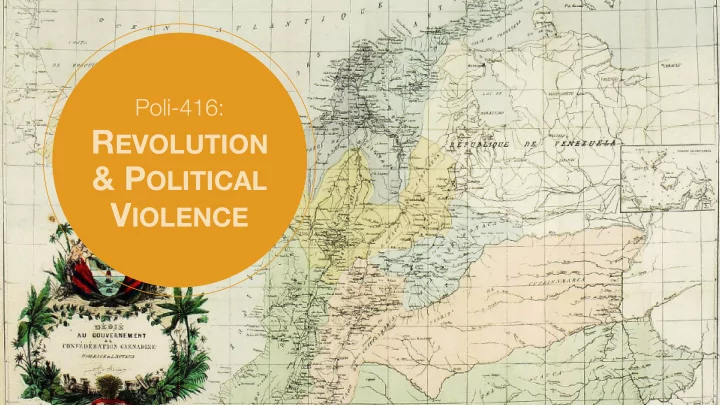

Poli-416: R EVOLUTION & P OLITICAL V IOLENCE
TODAY’S AGENDA 1 The graveyard of empires 2 Norms in conflict-termination
Who does this sound like? Country feels threatened by developments in Afghanistan, decides to invade Easily takes control of capital BUT Quickly faces insurgency, hit-and-run attacks Huge casualties, loss of civilian life Decade plus of war War unpopular at home, seen as hopeless “quagmire”
Who is it?
It’s the Soviets! In 1979! Withdraw in 1989 15k casualties Mujahideen victory highly influential
Soviet Navy Propaganda Do not undress to sunbathe or Prohibited! Prohibited! Do not enter swim in the sight of local Do not patronize Afghan stores, shops or markets whether population or near houses since into unauthorized government or private. Do not such behavior is not in keeping communications or obtain from there or from private with national and religious people any sort of item, food, liquor acquaintances customs of the Afghans and are or drugs considered offensive.
The Graveyard of Empires The US in Afghanistan • 2001 — ??? • Quick “victory” over Taliban • Insurgency begins 2003 • 70k killed (US side) • Obama withdrawal (2014) • Taliban re-re-re-resurgence Mullah Omar, • Expansive territorial control 2019, red = state control Ex-mujhaideen • Trump admin. negotiating US withdrawal with Taliban
The Daily
1 Conflict-Termination and the International System
The Puzzle Why is this happening?
The International System Across Time Pre-Cold War Post-Cold War 9/11 Victory Settlement/negotiations “Stabilization”? Uni-polarity, Non-state actors, Competition, International orgs, Terrorism, Proxy wars Peacekeepers Contagion
The Power of Norms What are “norms”? “Clusters of ideas of appropriate behavior” “Causes” in international politics (according to constructivism) Actor beliefs Material conditions Perspectives Power balance Rational/objective Decision-making Popular ideas or narratives
Norms do seem to matter Micro-lending
Norms in warmaking Are the FARC “combatants” or “terrorists”?
Peaceland and Survey Work Navigating terrain, language Aid workers -> as an outsider no local knowledge
How did norms shift? Pre-Cold War Post-Cold War 9/11 “World Police” Zero-sum beliefs “End of History” Spread of Belief in Total defeat capitalism/communism democratization of other side Optimism about Pessimism (?) Belief in total victory deliberation about deliberation Bipolarity Unipolarity Failed experiments
Counter-explanations What if local conditions got worse? More poverty, ethnic tension, grievances, etc. What if bargaining got easier? “These are Difficulty communicating, all constants” Easier to turn back on agreements What if peacekeepers got better? Stronger IOs, Better conflict-mediation methods
How well does the story fit? Iraq War —> instability in MENA Proxy conflicts in Syria Negotiations with the Taliban International orgs? How different are t2 and t3, really?
Implications Norms are flexible, We can advocate for better norms External actors can influence civil war outcomes
Big Picture What would you tell someone you learned from this article?
Recommend
More recommend